Abstract
The integration of artificial intelligence (AI) technology into various fields, particularly healthcare, has shown significant promise in enhancing efficiency and accuracy. However, the potential risks associated with unprofessional or inappropriate use of AI cannot be overlooked. The current landscape of healthcare demonstrates a growing reliance on AI tools, which is expected to expand in the future. Existing literature highlights the effectiveness of various AI applications, including chatbots, in specific medical domains. This study aims to review relevant literature in the pharmaceutical and galenic fields while evaluating a prominent AI chatbot provider. Based on the findings, this article presents critical considerations for researchers and practitioners. A thorough assessment of the benefits and risks associated with AI technologies is essential as these tools become increasingly prevalent in pharmaceutical practices.
Keywords: AI; Artificial intelligence; Chatbot; Pharmaceutical galenic; Risk management; Toxicology; Risks; Benefits; Accuracy
Introduction
Artificial intelligence (AI) encompasses a range of technologies designed to enable systems to analyze data, learn from experiences, and make informed decisions, all guided by human input (ISO, 2023).
As articulated by Jakub Kufel et al. [1], AI includes subsets such as machine learning (ML), artificial neural networks (ANNs), and deep learning (DL), which have gained traction in recent years. These technologies are increasingly applied in the medical field to enhance the speed and efficacy of disease diagnosis and treatment.
The impact of AI on pharmaceutical laboratories is profound, as highlighted at the Pharmalabs Conference in November 2025. AI applications are revolutionizing analytical processes, regulatory compliance, and quality control, thereby improving automation, data interpretation, and compliance monitoring. Regulatory authorities are beginning to emphasize the importance of aligning AI innovations with Good Laboratory Practice (GLP) and Good Manufacturing Practice (GMP) guidelines (Figure 1).
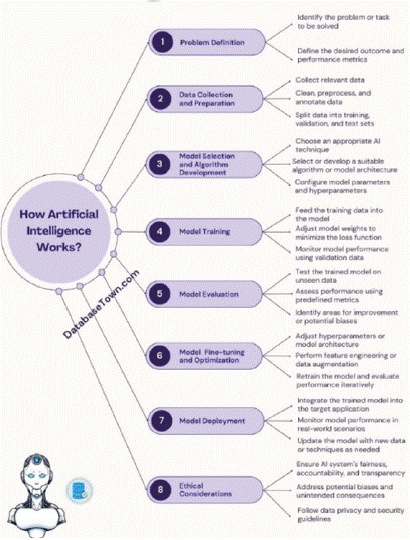
Figure 1: Adapted from Database Town.com How it work artificial
intelligence?
According to the FIP International Pharmaceutical Federation, the FIP Development Goals launched in September 2020 aim to transform the pharmacy profession globally by 2030. These goals emphasize the significance of digital health, focusing on education, workforce development, practice, and science (Figure 2).
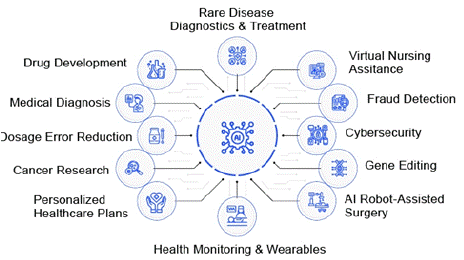
Figure 2: Adapted from Applications of Artificial Intelligence(Al) in Healthcare
Segment [2].
The wide-ranging applications of AI in drug discovery, dosage form design, process optimization, and pharmacokinetics/ pharmacodynamics studies are further explored by Lalitkumar K. Vora et al [3]. AI technologies, including deep learning, natural language processing, and computer vision, are driving advancements in telemedicine, diagnosis, drug development, and personalized treatment. In contrast to other scientific fields, pharmaceutical sciences can cause delays in data codification and standardisation. Data accumulation and standardisation are essential for effectively training AI in the former (Figure 3).
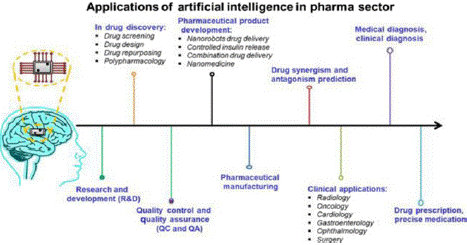
Figure 3: Applications of AI in the pharma sector adapted from Sultana A et al [4].
While the benefits of AI in healthcare are substantial—such as time savings, improved diagnostic accuracy, and enhanced data management—significant risks also accompany these advancements.
As noted by the Royal Pharmaceutical Society and other experts, it is crucial for pharmacists to develop an understanding of AI technologies to navigate the associated benefits and risks effectively. This research aims to explore these dynamics within the pharmaceutical galenic field, assessing both the transformative potential of AI and the imperative for risk management in its deployment [5-6].
The search for weaknesses or causes of errors is known as “root cause analysis.”
The goal of such an analysis in practice is to:
• Reduce or avoid downtime in production
• Minimize quality defects in manufactured products
• Identify unknown causal relationships and subsequently use them to optimize production plants and processes
Root cause analysis is a continuous task and a part of the continuous improvement process of a company, given the everincreasing demands for quality and optimization (Figure 4) errors in these large data sets.”
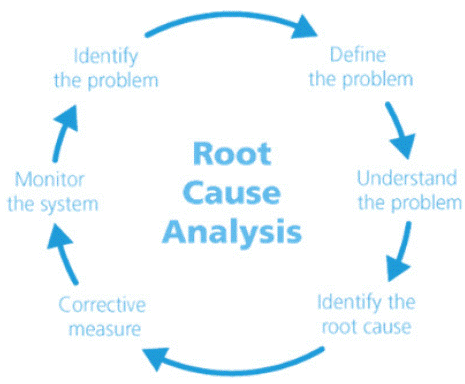
Figure 4: Adapted from AI-based root cause analysis of Hans-Ulrich
Kobialka 2022 [7].
Materials and Methods
This study employed an observational approach to review scientific literature pertinent to the integration of artificial intelligence (AI) in the pharmaceutical and galenic fields. Relevant articles were identified and analyzed to understand the current landscape of AI applications and their implications for pharmacy practice. Figures 1 to 5 were included to visually represent key concepts and findings discussed in the literature.
Additionally, a practical component was incorporated into the study, wherein a series of queries—ranging from simple to complex— were submitted to a well-known AI chatbot. The chatbot’s responses were documented and evaluated for accuracy and relevance to pharmaceutical practice. This practical experience aimed to provide insights into the capabilities and limitations of AI technology in addressing specific pharmaceutical inquiries.
Following the literature review and practical experience, a comprehensive conclusion was drawn to summarize the findings and implications for researchers and practitioners in the field.
Results
Literature Review Findings
Cognitive Limitations in Medicine: Aliasghar Karimi et al. noted that the human mind faces numerous obstacles in recalling and applying vast amounts of medical information. The proliferation of medical knowledge makes it impractical for clinicians to analyze extensive literature, leading to diagnostic errors primarily attributed to cognitive biases among healthcare workers. Medical errors remain a significant cause of mortality in the United States, often linked to human error [8].
AI in Pharmacy Practice: Sri Harsha Chalasani et al. highlighted AI as a transformative technology capable of enhancing medication management and patient care. By leveraging AI algorithms and machine learning, pharmacists can analyze extensive patient data, improving the identification of drug interactions and informing tailored recommendations [9].
Personalized Medicine: Lalitkumar K. Vora et al. emphasized that AI can facilitate personalized medicine through the analysis of real-world patient data, leading to improved treatment outcomes and adherence [10].
Streamlining Clinical Decisions: Kelsee Tignor et al. discussed how AI, referred to as pharmacointelligence, can assist clinical pharmacists in making evidence-based decisions by analyzing large volumes of patient data [11].
Enhancing Patient Safety: Rayn Oswalt noted that pharmacists are concerned about patient safety and that AI can help detect and prevent medication errors, thereby reducing adverse events and hospital readmissions [12].
Applications in Dosage Form Development: Praveen Halagali et al. reviewed AI’s applications in developing solid dosage forms, optimizing formulation processes, and assessing drug toxicity profiles, which streamline the path from pilot studies to market [13].
Excipient Compatibility: Ashutosh Kumar et al. pointed out that AI can significantly enhance the assessment of excipient compatibility, improving pharmaceutical development [14].
Predicting Drug Toxicity: Mahroza Kanwal Khan et al. highlighted the advantages of using AI to predict drug toxicity, which allows for a deeper understanding of drug interactions with biological systems [15].
Formulation Optimization: Negar Mottaghi et al. discussed how AI algorithms evaluate data to enhance the stability and compatibility of pharmaceutical ingredients, leading to improved formulations [16].
Pediatric Dosing: Andreea-Alexandra Mocrii et al. aimed to assist pediatricians in determining appropriate treatment doses for children based on various parameters [17].
Education on AI in Pharmacy: Muhammad Ahmer Raza et al. advocated for pharmacy education to incorporate AI and data science, emphasizing the need for pharmacists to develop skills that promote AI integration in practice [18].
Systematic Review of AI in Healthcare: Margaret Chustecki reported a systematic review yielding 8796 articles, which narrowed down to 44 studies. The review highlighted AI’s potential in healthcare, such as improving diagnoses and personalized treatment plans, while also addressing concerns about biases and data privacy [19].
Risk Prevention in Clinical Practice: Michela Ferrara et al. emphasized the usefulness of AI in risk prevention and incident reporting in clinical settings [20].
Advancing Toxicology: Nicole Kleinstreuer et al. noted that AI could advance toxicology into a more predictive discipline, safeguarding human and environmental wellbeing [21].
Risks Associated with AI: Mateusz LASKA et al. identified human error as a significant risk in AI applications, emphasizing the need for understanding and managing these technologies [22].
Ethical Considerations: Mitul Harishbhai Tilala et al. discussed the multifaceted ethical considerations surrounding AI in healthcare, including privacy, bias, and accountability [23].
3D Printing in Pharmaceutical Development: Timothy Tracy et al. highlighted the versatility of 3D printing technology in creating customized dosage forms, which accelerates formulation development [24].
Prescription Monitoring: Cinzia Barberini et al. described a system that interconnects prescription-related aspects, enhancing stock monitoring and preparation checks [25].
AI System Failures: Sasanka Sekhar Chanda et al. identified potential failure points in AI systems, including input errors and processing deficiencies, which can lead to inappropriate outputs [26].
Risks of AI in Medicine: Karim Lekadir et al. outlined seven main risks of AI in healthcare, including patient harm, misuse of tools, and gaps in accountability [27].
Chatbot Accuracy in Healthcare: Stefanie Beck et al. evaluated the accuracy of ChatGPT versions 3.5 and 4 in healthcare contexts, revealing discrepancies in adherence to established guidelines [28].
Variability in Chatbot Responses: Meron W. Shiferaw et al. noted inconsistencies in ChatGPT’s responses, highlighting errors that could result in clinical harm [29].
Performance Comparison of ChatGPT Versions: Ronald Chow et al. reported varying performance levels between ChatGPT versions, emphasizing the need for further development to enhance reliability in medical training and decision-making [30].
These findings underscore the transformative potential of AI in pharmacy and healthcare while also highlighting the associated risks and ethical considerations that must be addressed to ensure safe and effective implementation.
Experimental Project
In this section, a series of queries—ranging from simple to complex—were submitted to a widely recognized AI chatbot accessible for free on the web. The responses received are documented below:
1. Is digoxin water-soluble?Response: It is poorly soluble in water and more soluble in alcohol.
2. What is the molecular weight of NaCl?Response: 58.44 g/ mol.
3. Must collyria be sterile?Response: Yes, it is fundamental to avoid eye infections.
4. Is propranolol compatible with microcrystalline cellulose?Response: Yes.
5. Is omeprazole acid-sensitive?Response: Yes, it is inactivated in the acidic environment of the stomach.
6. What is the chemical structure of citric acid monohydrate?Response: (The chatbot did not provide a specific right structure).
7. Is lidocaine hydrochloride considered a poison by the Italian Pharmacopoeia No. 3?Response: Yes.
8. Is acetone flammable?Response: Yes.
9. What is the galenic use of NIPAGIN?Response: Preservative.
10. What is the water solubility of amoxicillin?Response: The water solubility is not extremely high, so specific formulations are needed to improve body absorption.
11. How can the solubility of water-insoluble active principles in galenic oral drops be increased?Response: Various strategies include using cosolvents like ethanol, glycerin, and propylene glycol; employing surfactants; utilizing cyclodextrin complexation; applying solubility enhancers (e.g., PEG); adjusting pH; and formulating suspensions.
12. How can the solubilization of a solute in a solution be increased?Response: Increase temperature, use a suitable solvent, apply agitation, increase the surface area of the solute, employ surfactants, adjust the pH, use co-solvents, apply pressure (for gases), and utilize complexants.
13. How many grams of KOH are needed to prepare a 100 ml solution at 30%?Response: Dissolve 30 grams in a total volume of 100 ml of solution.
14. How should medications be administered to children with difficulty swallowing?Response: Liquid suspensions, chewable tablets, dissolvable forms, powders, orally disintegrating tablets, other liquid forms, or suppositories.
15. What is the time needed to adequately mix APIs and excipients in the galenic field using a semi-automatic powder mixer to prepare capsules?Response: The chatbot provide answer as reported in the Figure 5.
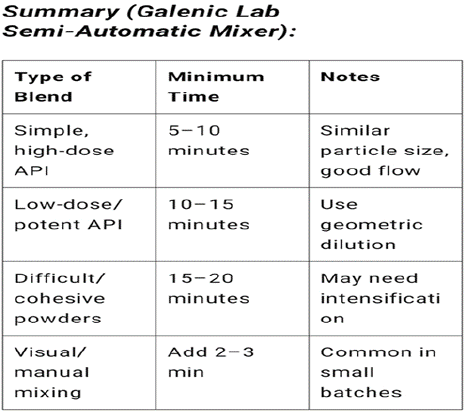
Figure 5: Response from an AI Chat bot.
Discussion
The applications of AI in the galenic field are diverse, ranging from robotic systems in oncology laboratories to software for laboratory management, algorithms for verifying incompatibilities, and assessing posology or toxicity. As with other disciplines such as medicine and technology, AI tools are being introduced to assist healthcare professionals, including those in the pharmaceutical sector. By incorporating AI into clinical practice, health care professionals can augment their decision-making processes and provide patients with personalized care. AI allows for greater collaboration between different healthcare services provided to a single patient [31-32].
In pharmaceuticals, adherence to regulatory and safety standards is paramount. Consequently, it is crucial to evaluate the results obtained from various AI instruments—be they robots, software, chatbots, or other technologies. The pharmaceutical industry demands certainty in drug production, while AI, by its nature, operates on probabilities and approximations. Despite the vast amounts of data and processing power available, AI models cannot guarantee exact outcomes, as they are trained on historical data and predict future behaviors based on identified patterns [33-35].
Understanding the algorithms utilized and the potential error rates associated with this emerging technology is essential. Key concepts in the healthcare field include continuous updating, digital competencies, and innovation. According to the FIP, integrating AI in pharmacy requires pharmacists to grasp not only the capabilities of these new technologies but also their limitations, data quality, regulatory compliance, ethical considerations, and the infrastructural investments necessary for successful implementation [36].
The responses generated by the AI in the experimental project were generally straight forward, differing from traditional search engines that yield multiple viewpoints from various sources. In this project, out of 15 scientific and technical questions posed, 14 responses were deemed acceptable, with one notable exception regarding the chemical structure of citric acid monohydrate, where the AI failed to provide the correct formula featuring three carboxylic acid groups [37-38].
The Limitations of AI Include
• Lack of transparency and explainability, making it difficult for users to understand AI and deep learning models.
• Potential biases in training data, which can lead to unequal treatment or misdiagnosis of certain demographic groups.
• New regulatory and legal challenges that complicate compliance with existing frameworks.
• Risks of manipulation through AI algorithms and increased control systems (e.g., facial recognition).
• Concerns regarding data privacy, particularly in the absence of explicit protective laws.
• Erosion of human influence in decision-making processes.
• Interoperability issues between existing healthcare systems and new data platforms.
• Accountability challenges in identifying responsibility for errors.
• Resistance from healthcare professionals towards adopting AI technologies.
• A general lack of trust in AI-generated recommendations.
• High costs associated with developing and implementing AI solutions.
• Absence of emotional intelligence and creativity in AI systems.
• Risks of diminishing critical thinking and judgment among healthcare professionals.
• Ethical dilemmas arising from AI decisions that may conflict with patient or family preferences.
• Data quality issues stemming from incomplete or inaccurate information.
• Potential cybersecurity threats, including ransomware, malware, data breaches, and privacy violations.
Conclusion
This study demonstrates that AI tools can be beneficial in guiding practices within the galenic field. However, the findings from the chatbot queries must be meticulously verified against established pharmaceutical standards. Of the 15 queries posed, 14 responses were found acceptable, resulting in a notable 6.7% rate of unacceptable responses. Given that the safety and efficacy of galenic products must adhere strictly to regulatory guidelines and prioritize patient health, human verification of chatbot-generated results is essential in the current landscape of pharmaceutical practice.
As AI continues to evolve and integrate into pharmaceutical applications, it is vital for professionals in the field to maintain a critical perspective, ensuring that the adoption of these technologies enhances rather than compromises patient safety and care.
References
- Kufel J, Bargiel-Laczek K, Kocot S, Kozlik M, Bartnikowska W, Janik M, et al. What Is Machine Learning, Artificial Neural Networks and Deep Learning? - Examples of Practical Applications in Medicine. Diagnostics (Basel). 2023; 13: 2582.
- Most Promising Applications of Artificial Intelligence (AI) in Healthcare Segment. 2022.
- Vora LK, Gholap AD, Jetha K, Thakur RRS, Solanki HK, Chavda VP. Artificial Intelligence in Pharmaceutical Technology and Drug Delivery Design. Pharmaceutics. 2023; 15: 1916.
- Sultana A, Maseera R, Rahamanulla A, et al. Emerging of artificial intelligence and technology in pharmaceuticals: review. Futur J Pharm Sci. 2023; 9: 65.
- Jessica H, Sarira E-D, Britney R, Joe Z, Betty BC & Parisa A. Applications of artificial intelligence in current pharmacy practice: A scoping review. Research in Social & Administrative Pharmacy: RSAP. 2025; 21: 134–141.
- Siafakas N, Vasarmidi E. Risks of Artificial Intelligence (AI) in Medicine. Pneumon. 2024; 37: 40.
- Hans-Ulrich Kobialka. AI-based root cause analysis. 2022.
- Aliasghar Karimi, Hamed HaddadPajouh. Artificial Intelligence, Important Assistant of Scientists and Physicians. Galen Med J. 2020; 9: e2048.
- Sri Harsha Chalasani, Jehath Syed, Madhan Ramesh, Vikram Patil, TM Pramod Kumar. Artificial intelligence in the field of pharmacy practice: A literature review. Explor Res Clin Soc Pharm. 2023: 12: 100346.
- Lalitkumar K Vora, Amol D Gholap, Keshava Jetha, Raghu Raj Singh Thakur, Hetvi K Solanki, Vivek P Chavda. Artificial Intelligence in Pharmaceutical Technology and Drug Delivery Design. Pharmaceutics. 2023.
- Kelsee Tignor, Laura Schalliol, Alexandra Glover. Artificial Intelligence and the Future of Specialty Pharmacy. US Pharm. 2025; 50: 29-32.
- Rayn Oswalt. The Role of Artificial Intelligence in Pharmacy Practice. Community/Retail Article. 2023.
- Praveen Halagali, Devika Nayak, Raagul Seenivasan, Jyothsna Manikkath, Mahalaxmi Rathnanand, Vamshi Krishna Tippavajhala. Artificial Intelligence Revolution in Pharmaceutical Sciences: Advancements, Clinical Impacts, and Applications. Curr Pharm Biotechnol. 2025.
- Ashutosh Kumar, Ghanshyam Das Gupta, Sarjana Raikwar. Artificial Intelligence Technologies used for the Assessment of Pharmaceutical Excipients. 2024; 30.
- Mahroza Kanwal Khan, Mohsin Raza, Muhammad Shahbaz, Iftikhar Hussain, Muhammad Farooq Khan, Zhongjian Xie, et al. The recent advances in the approach of artificial intelligence (AI) towards drug discovery. Front Chem. 2024; 12: 1408740.
- Negar Mottaghi-Dastjerdi, Mohammad Soltany-Rezaee-Rad. Advancements and Applications of Artificial Intelligence in Pharmaceutical Sciences: A Comprehensive Review. Iran J Pharm Res. 2024; 23: e150510.
- Andreea-Alexandra Mocrii, Oana-Sorina Chirila. AI-Assisted Application for Pediatric Drug Dosing. Stud Health Technol Inform. 2024.
- Muhammad Ahmer Raza, Shireen Aziz, Misbah Noreen, Amna Saeed, Irfan Anjum, Mudassar Ahmed, Shahid Masood Raza. Artificial Intelligence (AI) in Pharmacy: An Overview of Innovations. Innov Pharm. 2022; 13.
- Margaret Chustecki. Benefits and Risks of AI in Health Care: Narrative Review. Interact J Med Res. 2024.
- Ferrara M, Bertozzi G, Di Fazio N, Aquila I, Di Fazio A, Maiese A, et al. Risk Management and Patient Safety in the Artificial Intelligence Era: A Systematic Review. Healthcare (Basel). 2024; 12: 549.
- Nicole Kleinstreuer, Thomas Hartung. Artificial intelligence (AI)-it’s the end of the tox as we know it (and I feel fine). Arch Toxicol. 2024.
- Mateusz LASKA, Izabela KARWALA. Artificial Intelligence in the Chemical Industry – Risks and Opportunities. Scientific Papers of Silesian University of Technology 2023 Organization and Management Series No. 172. 2023.
- Mitul Harishbhai Tilala, Pradeep Kumar Chenchala, Ashok Choppadandi, Jagbir Kaur, Savitha Naguri, Rahul Saoji, et al. Ethical Considerations in the Use of Artificial Intelligence and Machine Learning in Health Care: A Comprehensive Review. Cureus. 2024.
- Timothy Tracy, Lei Wu, Xin Liu, Senping Cheng, Xiaoling Li. 3D printing: Innovative solutions for patients and pharmaceutical industry. Int J Pharm. 2023; 631.
- Cinzia Barberini, Enrica Lavezzini, Daniela Zoboli, Corrado Busani. Pharmaceutical preparations in the hospital. Analysis and in-house development of an automated system of management. Recenti Prog Med. 2018; 109: 122-123.
- Sasanka Sekhar Chanda, Debarag Narayan Banerjee. Omission and commission errors underlying AI failures. AI Soc. 2022: 1–24.
- Karim Lekadir, Gianluca Quaglio, Anna Tselioudis Garmendia, Catherine Gallin. Artificial intelligence in healthcare Applications, risks, and ethical and societal impacts. EPRS | European Parliamentary Research Service Scientific Foresight Unit (STOA). PE 729.512. 2022.
- Stefanie Beck, Manuel Kuhner, Markus Haar, Anne Daubmann, Martin Semmann, Stefan Kluge. Evaluating the accuracy and reliability of AI chatbots in disseminating the content of current resuscitation guidelines: a comparative analysis between the ERC 2021 guidelines and both ChatGPTs 3.5 and 4. Scand J Trauma Resusc Emerg Med. 2024; 32: 95.
- Meron W Shiferaw, Taylor Zheng, Abigail Winter, Leigh Ann Mike, Lingtak- Neander Chan. Assessing the accuracy and quality of artificial intelligence (AI) chatbot-generated responses in making patient-specific drug-therapy and healthcare-related decisions. BMC Med Inform Decis Mak. 2024; 24: 404.
- Ronald Chow, Shaakir Hasan, Ajay Zheng, Chenxi Gao, Gilmer Valdes, Francis Yu, et al. The Accuracy of Artificial Intelligence ChatGPT in Oncology Examination Questions. J Am Coll Radiol. 2024.
- Karimi A & HaddadPajouh H. Artificial Intelligence, Important Assistant of Scientists and Physicians. Galen Med J. 2020; 9: e2048.
- Chalasani SH, Syed J, Ramesh M, Patil V & Pramod Kumar TM. Artificial intelligence in the field of pharmacy practice: A literature review. Explor Res Clin Soc Pharm. 2023; 12: 100346.
- Halagali P, Nayak D, Seenivasan R, Manikkath J, Rathnanand M & Tippavajhala VK. Artificial Intelligence Revolution in Pharmaceutical Sciences: Advancements, Clinical Impacts, and Applications. Curr Pharm Biotechnol. 2025.
- Kumar A, Gupta GD & Raikwar S. Artificial Intelligence Technologies used for the Assessment of Pharmaceutical Excipients. 2024; 30.
- Mottaghi-Dastjerdi N & Soltany-Rezaee-Rad M. Advancements and Applications of Artificial Intelligence in Pharmaceutical Sciences: A Comprehensive Review. Iran J Pharm Res. 2023; 23: e150510.
- Raza MA, Aziz S, Noreen M, Saeed A, Anjum I, Ahmed M, et al. Artificial Intelligence (AI) in Pharmacy: An Overview of Innovations. Innov Pharm. 2022; 13.
- Chanda SS & Banerjee DN. Omission and commission errors underlying AI failures. AI Soc. 2022; 37: 1-24.
- Lekadir K, Quaglio G, Tselioudis Garmendia A & Gallin C. Artificial intelligence in healthcare: Applications, risks, and ethical and societal impacts. EPRS | European Parliamentary Research Service Scientific Foresight Unit (STOA). PE 729.512. 2022.
